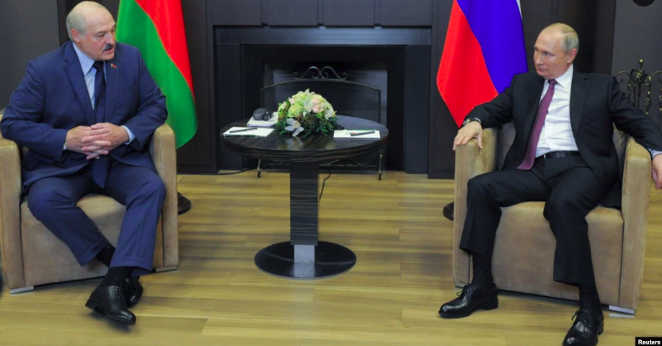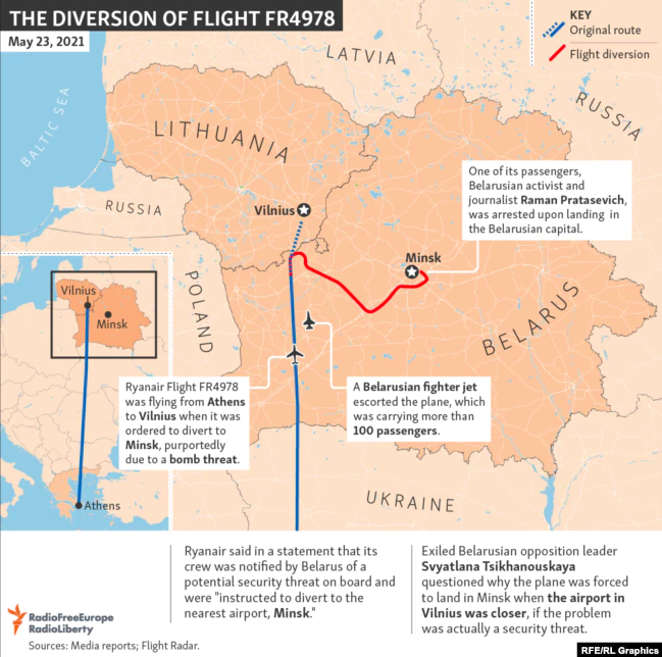Lukashenka, Putin Meet Amid Outrage Over Diversion Of Plane
By RFE/RL with reporting by AFP, dpa, Reuters, and TASS
31 May 2021, 12:48
 Belarusian authoritarian ruler Alyaksandr Lukashenka met in the Russian Black Sea resort city of Sochi with Russian President Vladimir Putin as EU foreign ministers debate possible targets for new economic sanctions against Minsk in response to its diversion of a commercial plane and the arrest of a journalist on board.
Belarusian authoritarian ruler Alyaksandr Lukashenka met in the Russian Black Sea resort city of Sochi with Russian President Vladimir Putin as EU foreign ministers debate possible targets for new economic sanctions against Minsk in response to its diversion of a commercial plane and the arrest of a journalist on board.
Greeting Lukashenka on May 28, Putin emphasized that the one-day meeting was scheduled prior to the "outburst of emotions" prompted by the plane diversion on May 23.
"We have topics to discuss without these developments," he told Lukashenka.
"Yes, it is an outburst of emotions," Lukashenka agreed.
Belarus dispatched a fighter jet to intercept a Ryanair commercial flight on May 23 and forced it to land in Minsk, where journalist Raman Pratasevich and his girlfriend, Sofia Sapega, a Russian national, were taken off the aircraft and detained.
Pratasevich, 26, is facing charges of inciting civil disturbances, an offense punishable by up to 15 years in prison. His lawyer, Inessa Alenskaya, said she met with him for the first time on May 27.
"All is well. He is in good spirits, positive, and cheerful," Alenskaya said. But she said she was unable to say where he is or provide other details.
Lukashenka said he would hand over to Putin unspecified documents relating to the Ryanair incident. He also said that his political opponents were seeking to "shake the situation to last August's level," referring to mass protests that broke out following a disputed presidential election that handed Lukashenka a sixth term in office.
Putin praised the integration process between the two countries, saying that "we are confidently moving in that direction." He added, however, that integration should not be rushed but should continue "proceeding gradually."
The European Union has been discussing possible economic sanctions against Belarus in response to the diversion of the plane, with several foreign ministers meeting in Lisbon on May 28 saying they should target sectors that most benefit the Belarusian leadership, such as the oil and potash sectors.
Europe's aviation regulator has already urged all airlines to avoid Belarusian airspace for safety reasons after the EU began to cut air links with the increasingly isolated Eastern European nation.
Following a May 28 meeting in The Hague with Dutch Prime Minister Mark Rutte, Belarusian opposition leader Svyatlana Tsikhanouskaya called on the EU to be "stronger, braver" in its treatment of Belarus.
She called for a "new package of sanctions" targeting officials involved in the Ryanair incident and the detention of Pratasevich.
Lukashenka and his allies have been under Western sanctions over a brutal crackdown on mass protests that followed the disputed election in August 2020.
The Ryanair flight was diverted after Belarusian authorities said they had received information there was a bomb on board the plane. No bomb was found in a search of the plane in Minsk.
Lukashenka has dismissed the outrage over the incident and maintained the diversion of the plane was justified by the purported bomb threat.
As an immediate consequence, the European Union agreed on May 24 to impose fresh sanctions, including moves to seal off the bloc's airspace to Belarusian airlines.
Some European airlines on May 27 said they were forced to cancel Moscow-bound flights after Russian authorities refused to approve route changes necessary for their flights to avoid Belarusian airspace.
The International Civil Aviation Organization (ICAO) Council on May 27 "decided to undertake a fact-finding investigation of this event," it said in a statement.
The ICAO, of which Belarus is a member, has no power to order sanctions, and Russia's support for Minsk means the UN Security Council is unlikely to agree on a collective statement.
An interim report will be produced by June 25, Irish Transport Minister Eamon Ryan said.
![Lukashenka, Putin Meet Amid Outrage Over Diversion Of Plane]()
EU foreign policy chief Josep Borrell warned on May 28 that there was a risk of an escalation after Moscow denied access to two European carriers that skirted Belarus en route to Moscow.
Air France said it had canceled another flight from Paris to Moscow on May 28 after Russia rejected a flight plan that would have skipped Belarusian airspace.
The airline was forced to make a similar cancellation on May 26, while Austrian Airlines said on May 27 that it had canceled a Vienna-Moscow flight after Russia failed to approve a new flight plan that skirted Belarusian airspace.
The U.S. Federal Aviation Administration (FAA) on May 28 cautioned U.S. airlines that fly passengers over Belarus but did not issue a formal advisory discouraging transit over Belarus.
The FAA said airlines should "exercise extreme caution until the agency can better assess Belarus's actions surrounding the May 23 diversion of a passenger jet and the potential for Belarus to repeat similar actions in the future."
U.S. airlines typically do not fly through Belarusian airspace. The notice does not apply to cargo carriers.
Russian Foreign Ministry spokeswoman Maria Zakharova said on May 28 that Western countries were being "completely irresponsible" and endangering passengers by banning flights over Belarus.
Lithuania has launched an investigation into the forced landing of the Ryanair plane, while the chief of the Baltic country's criminal police said on May 28 that the United States and Poland were also investigating the incident.
"In addition to Poland, which began its own pretrial investigation, we have confirmed information from our colleagues in the U.S. that the Federal Bureau of Investigation has launched its own inquiry," Rolandas Kiskis told a news conference.
31 May 2021, 12:48

Russian President Vladimir Putin (right) meets with his Belarusian counterpart in Sochi on May 28
Greeting Lukashenka on May 28, Putin emphasized that the one-day meeting was scheduled prior to the "outburst of emotions" prompted by the plane diversion on May 23.
"We have topics to discuss without these developments," he told Lukashenka.
"Yes, it is an outburst of emotions," Lukashenka agreed.
Belarus dispatched a fighter jet to intercept a Ryanair commercial flight on May 23 and forced it to land in Minsk, where journalist Raman Pratasevich and his girlfriend, Sofia Sapega, a Russian national, were taken off the aircraft and detained.
Pratasevich, 26, is facing charges of inciting civil disturbances, an offense punishable by up to 15 years in prison. His lawyer, Inessa Alenskaya, said she met with him for the first time on May 27.
"All is well. He is in good spirits, positive, and cheerful," Alenskaya said. But she said she was unable to say where he is or provide other details.
Lukashenka said he would hand over to Putin unspecified documents relating to the Ryanair incident. He also said that his political opponents were seeking to "shake the situation to last August's level," referring to mass protests that broke out following a disputed presidential election that handed Lukashenka a sixth term in office.
Putin praised the integration process between the two countries, saying that "we are confidently moving in that direction." He added, however, that integration should not be rushed but should continue "proceeding gradually."
The European Union has been discussing possible economic sanctions against Belarus in response to the diversion of the plane, with several foreign ministers meeting in Lisbon on May 28 saying they should target sectors that most benefit the Belarusian leadership, such as the oil and potash sectors.
Europe's aviation regulator has already urged all airlines to avoid Belarusian airspace for safety reasons after the EU began to cut air links with the increasingly isolated Eastern European nation.
Following a May 28 meeting in The Hague with Dutch Prime Minister Mark Rutte, Belarusian opposition leader Svyatlana Tsikhanouskaya called on the EU to be "stronger, braver" in its treatment of Belarus.
She called for a "new package of sanctions" targeting officials involved in the Ryanair incident and the detention of Pratasevich.
Lukashenka and his allies have been under Western sanctions over a brutal crackdown on mass protests that followed the disputed election in August 2020.
The Ryanair flight was diverted after Belarusian authorities said they had received information there was a bomb on board the plane. No bomb was found in a search of the plane in Minsk.
Lukashenka has dismissed the outrage over the incident and maintained the diversion of the plane was justified by the purported bomb threat.
As an immediate consequence, the European Union agreed on May 24 to impose fresh sanctions, including moves to seal off the bloc's airspace to Belarusian airlines.
Some European airlines on May 27 said they were forced to cancel Moscow-bound flights after Russian authorities refused to approve route changes necessary for their flights to avoid Belarusian airspace.
The International Civil Aviation Organization (ICAO) Council on May 27 "decided to undertake a fact-finding investigation of this event," it said in a statement.
The ICAO, of which Belarus is a member, has no power to order sanctions, and Russia's support for Minsk means the UN Security Council is unlikely to agree on a collective statement.
An interim report will be produced by June 25, Irish Transport Minister Eamon Ryan said.

EU foreign policy chief Josep Borrell warned on May 28 that there was a risk of an escalation after Moscow denied access to two European carriers that skirted Belarus en route to Moscow.
Air France said it had canceled another flight from Paris to Moscow on May 28 after Russia rejected a flight plan that would have skipped Belarusian airspace.
The airline was forced to make a similar cancellation on May 26, while Austrian Airlines said on May 27 that it had canceled a Vienna-Moscow flight after Russia failed to approve a new flight plan that skirted Belarusian airspace.
The U.S. Federal Aviation Administration (FAA) on May 28 cautioned U.S. airlines that fly passengers over Belarus but did not issue a formal advisory discouraging transit over Belarus.
The FAA said airlines should "exercise extreme caution until the agency can better assess Belarus's actions surrounding the May 23 diversion of a passenger jet and the potential for Belarus to repeat similar actions in the future."
U.S. airlines typically do not fly through Belarusian airspace. The notice does not apply to cargo carriers.
Russian Foreign Ministry spokeswoman Maria Zakharova said on May 28 that Western countries were being "completely irresponsible" and endangering passengers by banning flights over Belarus.
Lithuania has launched an investigation into the forced landing of the Ryanair plane, while the chief of the Baltic country's criminal police said on May 28 that the United States and Poland were also investigating the incident.
"In addition to Poland, which began its own pretrial investigation, we have confirmed information from our colleagues in the U.S. that the Federal Bureau of Investigation has launched its own inquiry," Rolandas Kiskis told a news conference.

